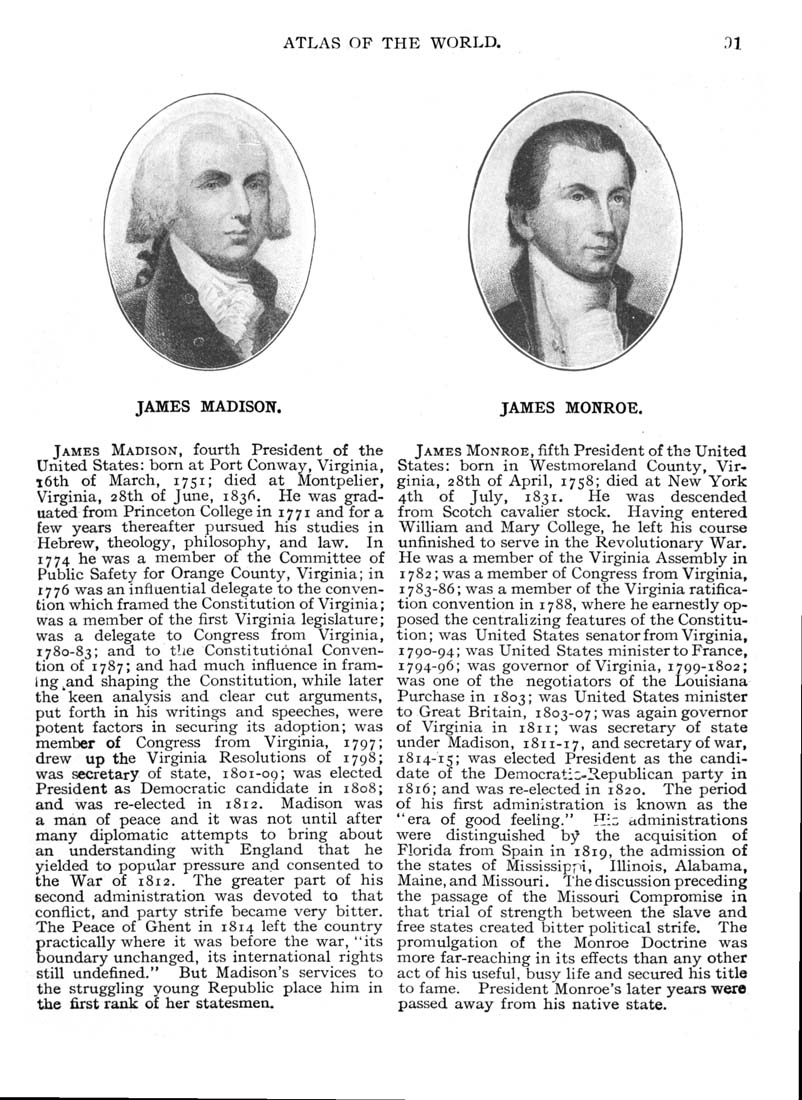ATLAS OF THE WORLD,
JAMES MADISON.
James Madison, fourth President of the
United States: bom at Port Conway, Virginia,
T6th of March, 1751; died at Montpelier,
Virginia, 28th of June, 1836. He was grad¬
uated from Princeton College in 1771 and for a
few years thereafter pursued his studies in
Hebrew, theology, philosophy, and law. In
1774 he was a member of the Committee of
Public Safety for Orange County, Virginia; in
1776 was an influential delegate to the conven¬
tion which framed the Constitution of Virginia;
was a member of the first Virginia legislature;
was a delegate to Congress from Virginia,
1780-83; and to the Constitutional Conven¬
tion of 1787; and had much influence in fram¬
ing ^and shaping the Constitution, while later
the keen analysis and clear cut arguments,
put forth in his writings and speeches, were
potent factors in securing its adoption; was
member of Congress from Virginia, 1797;
drew up the Virginia Resolutions of 1798;
was secretary of state, 1801-09; was elected
President as Democratic candidate in 1808;
and was re-elected in 1812. Madison was
a man of peace and it was not until after
many diplomatic attempts to bring about
an understanding with England that he
yielded to popular pressure and consented to
the War of 1812. The greater part of his
second administration was devoted to that
conflict, and party strife became very bitter.
The Peace of Ghent in 1814 left the country
practically where it was before the war, "its
boundary unchanged, its international rights
still undefined." But Madison's services to
the struggling young Republic place him in
the first rank of her statesmen.
JAMES MONROE,
James Monroe, fifth President of the United
States: bom in Westmoreland County, Vir¬
ginia, 28th of April, 1758; died at New York
4th of July, 1831. He was descended
from Scotch cavalier stock. Having entered
William and Mary College, he left his course
unfinished to serve in the Revolutionary War.
He was a member of the Virginia Assembly in
1782; was a member of Congress from Virginia,
1783-86; was a member of the Virginia ratifica¬
tion convention in 1788, where he earnestly op¬
posed the centralizing features of the Constitu¬
tion; was United States senator from Virginia,
1790-94; was United States minister to France,
1794-96; was governor of Virginia, 1799-1802;
was one of the negotiators of the Louisiana
Purchase in 1803; was United States minister
to Great Britain, 1803-07; was again governor
of Virginia in 1811; was secretary of state
under Madison, 1811-17, and secretary of war,
1814-15; was elected President as the candi¬
date of the Democratic-Xepublican party in
1816; and was re-elected in 1820. The period
of his first administration is known as the
"era of good feeling." Hi:: administrations
were distinguished b^ the acquisition of
Florida from Spain in 1819, the admission of
the states of Mississipri, Illinois, Alabama,
Maine, and Missouri. The discussion preceding
the passage of the Missouri Compromise in
that trial of strength between the slave and
free states created bitter political strife. The
promulgation of the Monroe Doctrine was
more far-reaching in its effects than anjr other
act of his useful, busy life and secured his title
to fame. President Monroe's later years were
passed away from his native state.
|








